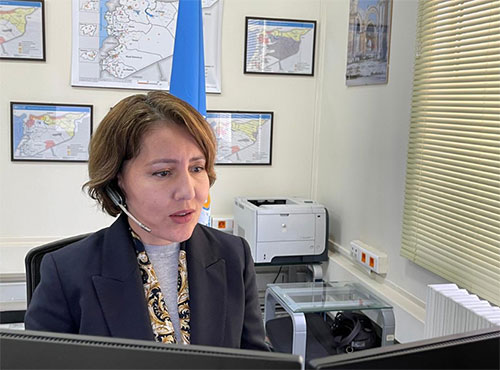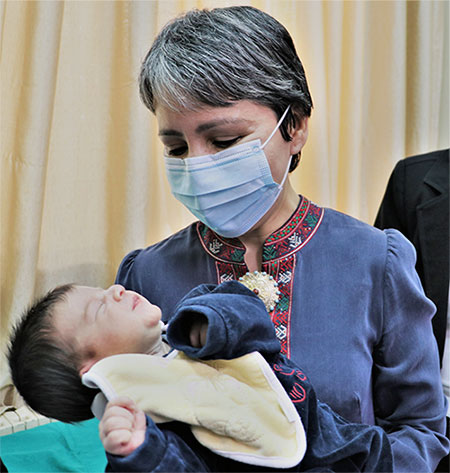Statement by Dr Akjemal Magtymova, WHO Representative, on the arrival of COVID-19 vaccines at the Ministry of Health in Syria on 21 April 2021
Your Excellency, Dr Hassan Al-Gabbash, Minister of Health of the Syrian Arab Republic,
My colleague, UNICEF Representative, acting UN Resident Coordinator and Humanitarian Coordinator, Mr Viktor Bo,
Your Excellency, Mr Hafizur Rahman Ambassador of India to the Syrian Arab Republic,
Ambassador Mr Milad Atiah, Ministry of Foreign Affairs
Representatives from international and national organizations, United Nations, dignitaries, media, ladies and gentlemen.
At the beginning of 2020, the world woke up to the new reality. Nobody thought that the new pandemic will re-emerge again, after the last deadliest pandemic caused by influenza H1N1 virus that lasted for 2 years from 1918, taking 50 million lives and infecting 500 million people. A hundred years later, with all the social advancement, economic growth and all the knowledge we have acquired, we were not ready to face the coronavirus pandemic.
Today over 142 million COVID-19 confirmed cases. We have lost over 3 million lives in just a year. Economic collapse is staggering. Millions of people across the globe lost livelihoods. COVID-19 touched every country and every family; and the virus continues to spread in its various forms, affecting younger and stronger population.
This pandemic happened when the world community was shifting its attention to the noncommunicable diseases (NCDs). In fact, due to the high NCDs burden, people with co-morbid conditions were the first victims of the COVID-19, those who suffered from diabetes, cardiovascular diseases, chronic respiratory diseases.
COVID-19 has taken lives indiscriminately, women, men. The frontline health workers – those who saved many lives in this battle – continue carrying the highest risk of COVID-19 transmission and continue to be on a call of duty often risking their lives.
Now it all the more important for health workers to be vaccinated first.
In Syria, as well as across the globe, WHO strongly recommends vaccinating this high-risk group first for them to be protected so they can continue saving the lives of the rest of the society. This is in line with the recommendations of the WHO’s strategic advisory group of experts on immunization for vaccine prioritization.
While the global scientific community and international entities have made extraordinary efforts to develop and mass produce vaccines, the vaccines remain a precious commodity.
There are currently hundreds of vaccine candidates in different stages of trial, when the prerequisites stages are completed, the vaccines dossiers are submitted to WHO for review and approval for Emergency Use Listing. Currently, there are 19 vaccines under WHO review, and only 4 have been approved after stringent review. AstraZeneca is one of the vaccines approved by WHO, and made available by the COVAX facility under the advanced market commitment to the widest number of countries.
Everyone contributes to the fight against COVID-19. There is a role for every single individual and each of us to stop the pandemic.
There are unprecedented efforts for vaccine production. Yet the vaccine quantities produced are still not sufficient for the entire humanity and access to it gets prioritized, vaccine equity remaining the main concern. We are hoping that in collaboration with COVAX, GAVI, UNICEF, we will be able to secure more vaccines to meet the National Deployment and Vaccination Plan for Syria and contribute towards global combat against COVID-19.
I am grateful for all the member states and governments who are behind this global initiative and committed extraordinary financial back up for accelerated development and distribution that aims for equity and availability across the globe.
I would like to thank the Indian Government for its generosity in allocating February 2021 lot of vaccines to Syria and sending 203,000 doses of precious vaccines for people of Syria. I am thankful for His Excellency Indian Ambassador for his presence today at this ceremony.
The government of Syria, the Ministry of Health of the Syrian Arab Republic planned for months together with WHO and UNICEF, methodically writing NDVP and thoughtfully creating microplans for equitable distribution of vaccines across all its governorates. The Syrian National vaccination platform is one of the strongest public health programmes in the Region. This platform and its institutional memory serve best the purpose for rolling out the COVID-19 vaccine.
Nothing is easy and the road ahead is not without a challenge. But with determination, solidarity and joining efforts for local implementation of the immunization in each setting in Syria, we should be able to make the best use of available vaccines - best public health intervention to curb ongoing pandemic and save lives.
Opening remarks by Akjemal Magtymova, Head of Office and WHO Representative, Syria
WHO EMRO Virtual Press Conference, 14 April 2021 (13.00 Cairo time)
Overall situation
 Last month marked one year since the first reported COVID case in Syria. It also marked 10 years since the start of the ongoing Syrian crisis. Compared to war and starvation – 12.4 million people in Syria are food insecure, a 25% increase in the past months - the pandemic seems benign to many Syrians. This wrong impression may also be due to the fewer number of COVID-19 cases detected and announced so far. As of the today, there are 54,308 confirmed cases and 2,451 deaths. It is in no way the real state of affairs.
Last month marked one year since the first reported COVID case in Syria. It also marked 10 years since the start of the ongoing Syrian crisis. Compared to war and starvation – 12.4 million people in Syria are food insecure, a 25% increase in the past months - the pandemic seems benign to many Syrians. This wrong impression may also be due to the fewer number of COVID-19 cases detected and announced so far. As of the today, there are 54,308 confirmed cases and 2,451 deaths. It is in no way the real state of affairs.
This is mainly a result of inadequate laboratory testing and local surveillance capacities, lack of equipment, supplies and reagents. For WHO to provide epidemiological evidence, generate predictions and mitigate risks, we need more data, and our first priority is to strengthen testing capacity.
As I speak, Syria is witnessing the 3rd wave of COVID-19, presence of multiple variants of the virus.
I acknowledge a delicate balance between protecting the economy and introducing public health measures to reduce transmission. This becomes an ethical dilemma in the Syrian context, especially when for some it means to lose livelihoods. More than 90% of the population is living under the poverty line, compared to 28% in 2010.
While Syria fights COVID-19 in the context of continued hostilities, with a crippled public health capacity to cope, today we are witnessing more livelihoods and lives lost. The country and its people are pushed to even deeper devastation, economy driven further down over the past year:
Half of the work-age population is now unemployed; hundreds of thousands of jobs lost since the beginning of the pandemic.
Remittances, on which millions of Syrians rely, have halved due to global and regional economic contraction. [from US $1.6 billion in 2019 to $800 million in 2020].
The Syrian pound is in virtual freefall having lost 78% of its value in a year, accompanied with 236% price increase of average food basket.
Humanitarian needs are increasing.
Over 12.4 million people are in need of health aid, especially people living in camps and camplike settlements.
1/3 of the population are IDPs.
COVAX Vaccines
Syria is 1 of 92 countries eligible for advanced market commitment under COVAX facility, a platform co-led by WHO, CEPI (Coalition of Epidemic Preparedness Innovation) and GAVI (Global Vaccine Alliance). We have been working with UNICEF and COVAX facility, and partners, to make vaccines available throughout Syria with the aim to cover 20% of the population by end of 2021.
National deployment plan prioritizes high risk groups equitably across all administrative areas. The plan under COVAX is to cover 20% of the population in two phases: 3% in the first phase by end of June 2021 and 17% by end of December 2021. As elsewhere in the globe, health workers will be the prioritized for the first vaccine doses. Important to note that in Syria, over half of the health care workforce fled the country since the conflict began, the remaining medical staff struggle to cope with the overwhelming health needs, while continuously surviving the pervasive threat of kidnapping and targeted attacks . Without health workers, no health care can be ensured. They must be prioritized first.
WHO has been present in Syria throughout most difficult times and operates, based on its principles of independence, impartiality and neutrality. For vaccination, we will use all modalities approach to reach high risk groups. The vaccine distribution will be channeled using institutional memory and platform of the current national vaccination by the MOH, that includes crossline shipments for NES, as well as we will use crossborder operation for vaccination in NWS, from Gaziantep.
COVAX has allocated AZ SII for the first batch of vaccine shipment to Syria and we are counting the last mile to bring vaccines. The pathway is not without challenges and we need continued support from the international community not only to cover immediate vaccine administration costs but also to support the work of WHO in Syria as a provider of last resort in one of the most complex emergencies in the world.
1 Recent attack on health – Al Attareb surgical hospital, 16 injured, 4 dead; in busy neighborhood of Aleppo city 14 injured and 2 dead after hostile exchanges
Speeches
Statement by Dr Akjemal Magtymova at the vaccine arrival event at the Ministry of Health, Syria
22 April 2021
Opening remarks by Akjemal Magtymova, Head of Office and WHO Representative, Syria
WHO EMRO Virtual Press Conference, 14 April 2021
Update on the health situation in Syria – Brussels 5 Conference
23 March 2021
I want to focus on hope | Translated article from Russian
8 March 2021
WHO Syria 2020 year-end results | video statement by the WHO Representative
4 February 2021
The Ministry of Health receives medical aid from the World Health Organization
24 October 2020
The arrival of a 80-ton airlifted medical shipment from WHO warehouses in Iraq to Damascus airport
1 July 2020
‘God forbid’ COVID-19 reaches Syria’s camps, warns WHO medic | | UN News
29 June 2020
Interview with Minister of State Rt Hon Cleverly
29 June 2020
Press Briefing at "Palais des Nations"
26 June 2020
Workshop session on the trajectory of the Syria crisis
28 September 2020
Patient Safety Day 2020
21 September 2020

WHO Representative

Ms Bethke was appointed WHO Representative a.i. to the Syrian Arab Republic on 19 October 2024. She joined the WHO Syria Office in 2022, first serving as Emergency Team Lead and, in July 2024, moving to the position of WHO Deputy Representative.
Ms Bethke has extensive experience in public health, humanitarian health response, health cluster coordination, and resource mobilization. She served as Health Cluster Coordinator in Lebanon for 2 years following the Beirut Port Explosion in 2020, as Whole of Syria Health Cluster Coordinator for 3 years, starting in 2019, and led the WHO emergency response to the earthquake in Syria in February 2023.
Ms Bethke has worked with UN and international organizations in Liberia, Lebanon and Jordan. She holds 2 master’s degrees – in public health and in clinical social work – from Boston University, and a bachelor’s degree in psychology and Spanish from Vanderbilt University.








